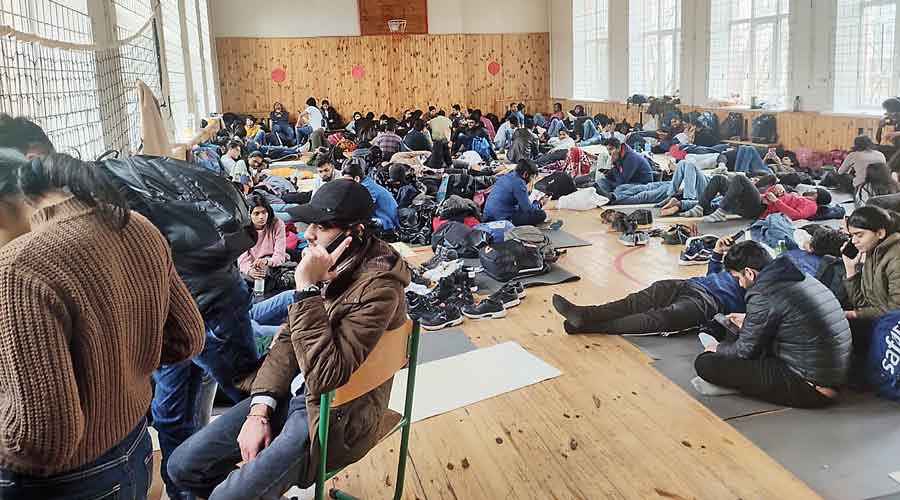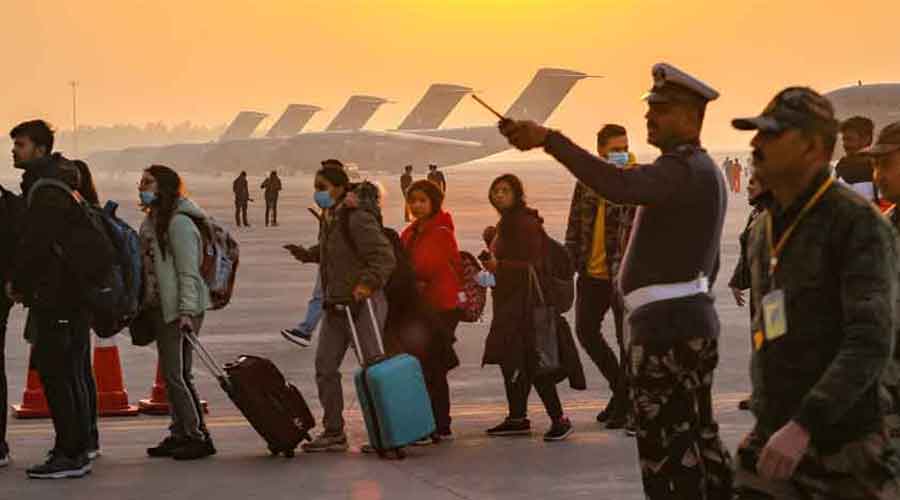Indian students stranded in the eastern Ukraine cities of Kharkiv and Sumy could not be moved out on Friday with Russia and Ukraine failing to establish the humanitarian corridor agreed at their meeting a day earlier, prompting desperate calls for help from the students’ bunkers.
Nor was India able to take up the Russian offer to ferry the students, who are running out of rations and water, from the two cities in the conflict zone.
“The buses are actually about 50-60km away from where the students are. It is too far for them to walk,” external affairs ministry spokesperson Arindam Bagchi said in the context of Russia’s announcement that it had 130 buses waiting to ferry stranded international students, including Indians.
“Also, we do not see a safe and secure way to take them out without at least a local ceasefire,” Bagchi said.
Colonel General Mikhail Mizinstev, head of the Russian National Defence Control Centre, had on Thursday said: “A total of 130 comfortable buses are ready to depart to Kharkov (Kharkiv) and Sumy from the Nekhoteyevka and Sudzha checkpoints in the Belgorod Region since 6am today in order to rescue Indian students and citizens of other foreign states.”
He had added that arrangements had been made for their stay and onward travel, including flying them out to India on Russian aircraft.
“The most difficult task is to take the students out of the conflict zone. Once in Russia, we can send our aircraft to bring them back,” Bagchi said, admitting that the government was aware of the dire circumstances in which the students were holed up in bunkers.
On whether any headway had been made on creating the humanitarian corridor that Mykhailo Podoliak, adviser to the Ukrainian President, had announced on Thursday night, Bagchi said: “We have seen reports but haven’t seen anything further to that on the ground. If that works out, it will help us.”
Podoliak had tweeted after the second round of negotiations between the Russians and Ukrainians in Belarus that “there is a solution only for the organisation of humanitarian corridors”.
The Russian announcement on the buses too came around the same time.
India has been able to arrange a few buses to remove the students who had moved to the Russian-designated safe zone of Pisochyn on Wednesday. Two busloads of around 40 students left for Lviv near the Polish border on Thursday and three more buses ferried similar-sized batches on Friday towards the Moldovan border, which is closer.
Around 1,000 students had moved from Kharkiv to Pisochyn — an urban settlement in the same province — on Wednesday based on inputs provided by the Russians.
Bagchi said that efforts were on to arrange for more buses, but this was proving difficult because most buses were being used by the Ukrainian army. Also, there is a shortage of drivers, and fuelling the buses is a challenge too.
Over 20,000 Indians have left Ukraine since the first advisory was issued in mid-February. Of them, some 10,344 have been brought back to India on evacuation flights. With 16 evacuation flights scheduled over the next 24 hours, the ministry said the “vast majority” of the Indians from Ukraine would be home by Saturday.
India on Friday opened a new departure point for the evacuation flights, scheduling one from Bratislava in Slovakia. This is in addition to Kosice in Slovakia, Bucharest and Suceava in Romania, Rzeszow in Poland and Budapest in Hungary.
India again abstained from voting on the Ukrainian situation — this time at the United Nations Human Rights Council in Geneva on a resolution to set up an “independent international commission of enquiry as a result of Russia’s aggression against Ukraine”.
While India voted in line with its stated position on the matter, New Delhi has of late desisted from supporting such international commissions of inquiry by the UNHRC.
Two recent instances are India’s abstention from voting on the establishment of a commission to examine human rights violations during last year’s Israel-Hamas conflict in Gaza, and on a similar move on Sri Lanka earlier in 2021.











